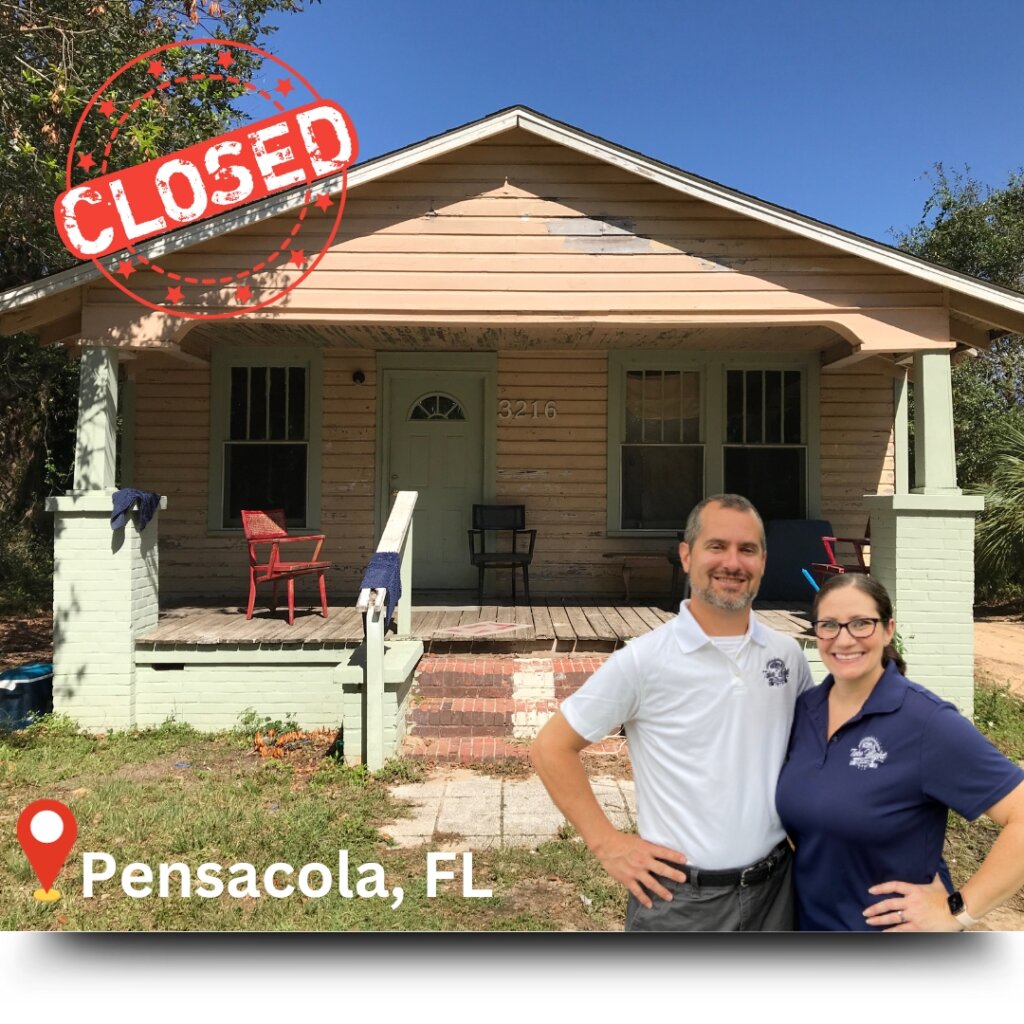
Selling an Inherited Property in Florida
Selling an inherited property in Florida can be both an emotional and complicated process. Whether you’ve inherited a family home or an investment property, you may face unique challenges, including legal obligations, tax implications, and disagreements among heirs. This guide will walk you through the steps of selling an inherited property, from understanding your role as an executor to resolving debts, dealing with multiple heirs, navigating taxes, and different methods of selling to meet your goals.
How to Sell an Inherited Property in Florida
Before selling an inherited property, it’s essential to determine who the executor of the estate is. The executor, also known as the personal representative, is responsible for managing the deceased person’s estate, including paying off debts and distributing assets, such as property, according to the will. If no executor has been named, the court may appoint someone to fill this role.

Determine the Executor
Before selling an inherited property, it’s essential to determine who the executor of the estate is. The executor, also known as the personal representative, is responsible for managing the deceased person’s estate, including paying off debts and distributing assets, such as property, according to the will. If no executor has been named, the court may appoint someone to fill this role.
Key Responsibilities of the Executor:
- Filing the will with the court and initiating probate, if necessary.
- Handling any debts or claims against the estate.
- Overseeing the sale of the property and ensuring all legal requirements are met.
How This Affects the Sale:
The property cannot be sold until the executor is authorized by the court to act on behalf of the estate. If the property is to be sold, the executor will typically handle the process, but all heirs will need to be involved in decisions.

Working with Lawyers and Real Estate Agents
When selling an inherited property, it’s often beneficial to work with professionals such as lawyers and real estate agents. A real estate lawyer can help navigate the legal complexities of probate, title transfers, and resolving any outstanding legal matters tied to the property. They can also provide advice on managing disputes between heirs and ensuring compliance with state and federal laws.
A real estate agent can assist with marketing the property, handling negotiations, and finding buyers. However, it’s important to remember that agents typically charge a commission, which can reduce your final profit. Depending on your situation, selling to a direct buyer like Take Flight Home Buyers may save you time and money by avoiding commissions and lengthy negotiations.

Resolve Any Debts
Inherited properties often come with outstanding debts that must be settled before the sale. This could include mortgage payments, property taxes, liens, or other debts tied to the estate.
Steps to Resolve Debts Before Selling:
- Mortgage: Ensure that the mortgage is either paid off or arrangements are made to settle it at closing.
- Tax Obligations: Any unpaid property taxes must be cleared. In some cases, the sale of the home can cover these debts.
- Liens and Other Debts: Check for any liens on the property, as these will need to be paid off before a sale can be finalized.
By resolving these financial matters upfront, you can ensure a smoother sale process and avoid delays or complications later on.

Clean & Restore the Home
Before selling an inherited property, it’s crucial to assess its condition. In many cases, inherited homes may have been unoccupied for some time and may need cleaning, minor repairs, or even significant restoration. Clearing out personal belongings, deep cleaning, and ensuring the home is presentable can increase its appeal to buyers. Some homeowners choose to invest in renovations to boost the home’s value, while others may prefer a quick sale without the hassle of repairs.
If the idea of cleaning, restoring, or renovating feels overwhelming, consider selling the home as-is. At Take Flight Home Buyers, we purchase properties in any condition, allowing you to avoid the costs and effort of repairs and cleanup. This can be especially helpful if you live out of state or don’t have the resources to manage the home’s upkeep.
Contact Us today for your cash offer!
Contact us today and get a competitive cash offer for an inherited house, condo, or property. We buy homes in any condition, and we can also help with the convoluted process of selling a house in probate!
Do all heirs have to agree to sell the property?
In cases where there are multiple heirs, selling an inherited property can become complex. All heirs generally need to agree on the sale of the property, which can lead to disputes if there are differing opinions. Some heirs may want to sell, while others may prefer to keep the property for personal or sentimental reasons.
How to Settle a Disagreement
Disagreements among heirs about selling inherited property are common. Here are some ways to handle disputes:
- Mediation: If heirs cannot agree, mediation can help. A neutral third-party mediator can facilitate discussions and help everyone reach a compromise.
- Partition Lawsuit: If mediation fails, an heir who wants to sell the property can file a partition lawsuit. This legal action forces the sale of the property, with proceeds divided among the heirs. However, this can be a time-consuming and costly process.
- Buying Out Other Heirs: One option to settle disagreements is for one heir to buy out the shares of others. This way, those who wish to sell can receive their share, and those who want to keep the property can do so.
Best Practices
To avoid conflicts:
- Seek Legal Counsel: Working with a real estate attorney can help clarify rights and responsibilities, ensuring all parties are on the same page.
- Open Communication: Ensure that all heirs are informed and involved in the process from the start.
- Set Clear Expectations: Be transparent about the financial and legal aspects of selling the property.
What Should I Do About Utilities and Maintenance While Selling an Inherited Property?
Managing utilities and maintenance for an inherited property is often overlooked but essential, especially if the property is vacant during the selling process. Keeping the home in good condition ensures it remains market-ready and avoids unexpected issues that could delay the sale.
Utilities
Make sure to keep essential utilities, such as electricity, water, and gas, active during the selling period. This allows for inspections, cleaning, and potential showings if selling traditionally. Additionally:
- Set up forwarding for any mail related to utility bills.
- Contact utility providers to update account information and ensure all bills are paid on time.
Maintenance
Regular maintenance is necessary to keep the property in good shape. Consider the following:
- Yard Work: Keep the lawn mowed and landscaping tidy to maintain curb appeal.
- Pest Control: Schedule pest inspections, especially if the property has been unoccupied.
- Security: If the property is vacant, consider installing security cameras or using timers for lights to deter potential break-ins.
If maintaining the property is too burdensome, selling to a cash buyer like Take Flight Home Buyers can help eliminate these ongoing responsibilities. We purchase homes in any condition, so you don’t have to worry about upkeep during the sale process.
How Do I Determine the Market Value of an Inherited Property?
Knowing the market value of the inherited property is crucial for making informed decisions about selling. The market value is the price a buyer is willing to pay, which may differ from sentimental value or what heirs expect. An accurate understanding of the property’s worth helps set realistic expectations and avoid pricing disputes among heirs.
How to Determine Market Value
- Hire an Appraiser: A professional appraisal provides an unbiased estimate of the property’s value based on its condition, location, and recent sales of similar homes in the area.
- Get a Comparative Market Analysis (CMA): A real estate agent can prepare a CMA that evaluates recent local sales data to estimate a competitive listing price.
- Research Online Tools: While not as precise as appraisals or CMAs, online valuation tools can provide a general idea of the home’s worth.
When to Sell As-Is
If the appraised value is lower than expected due to the property’s condition, selling as-is may be the best option. Take Flight Home Buyers can provide a fair, cash offer based on the property’s current market value, allowing you to sell quickly without investing in costly repairs or renovations.
How is inherited property taxed when sold?
Selling inherited property in Florida has specific tax implications. It’s crucial to understand how taxes like capital gains, estate taxes, and inheritance taxes may affect the sale.

Capital Gains Tax on Inherited Property
When you sell an inherited property, you may be subject to capital gains tax, but there’s good news: Florida offers a “stepped-up basis” for inherited property. This means the property’s value is adjusted to its market value at the time of the original owner’s death.
Example:
If the original owner bought the property for $150,000 and it’s now worth $300,000 at the time of their death, your capital gains are calculated based on the value of $300,000, not the original purchase price.
How This Helps You:
If you sell the property soon after inheriting it, your capital gains could be minimal since the stepped-up basis reduces the difference between the inherited value and the selling price.

Estate Taxes
Florida does not have an estate tax, but large estates may still be subject to federal estate tax. In 2024, the federal estate tax exemption is $13.36 million per individual. If the total value of the estate, including the inherited property, exceeds this amount, estate taxes may apply. However, most properties will not be subject to federal estate tax, as they typically fall below this threshold.

Inheritance Taxes
Florida is also one of the few states that does not impose an inheritance tax. However, if you or other heirs live in states that do have inheritance taxes, you may need to check those state laws. Keep in mind, any out-of-state heirs should consult with a tax advisor to ensure they understand their tax obligations.
What documents are required to sell an inherited property?
Selling an inherited property involves more paperwork than a standard real estate transaction. Here’s a list of the key documents you’ll need to gather to ensure a smooth sale:
- Will and Probate Documentation:
- The will, if there is one, will help prove ownership and establish the executor’s authority to sell the property.
- If the estate is going through probate, the court will issue a document that authorizes the executor to act on behalf of the estate.
- Death Certificate:
- A certified copy of the death certificate is typically required to prove the previous owner’s passing.
- Affidavit of Heirship (if applicable):
- This document may be required if there is no will or if it’s unclear who the rightful heirs are. It establishes the legal heirs of the estate.
- Property Deed:
- The deed provides proof of ownership and includes a legal description of the property. The executor may need to transfer the deed into the names of the heirs or the buyer, depending on how the property is sold.
- Title and Mortgage Information:
- It’s important to have the title for the property and any information related to outstanding mortgages or liens. This will be necessary to clear the title for sale.
- Tax Records:
- Having recent property tax records on hand is important for both the sale and to resolve any outstanding debts.
Gathering these documents in advance can streamline the selling process, allowing for a quicker closing and reducing the risk of delays.
Is there an easier way to sell?
Selling an inherited property can be overwhelming. Between dealing with probate, legal documents, taxes, and potential disagreements among heirs, the process can drag on for months. That’s where Take Flight Home Buyers comes in.
We specialize in buying inherited properties quickly and efficiently, offering a simple, cash sale. Whether you’re facing probate, tax issues, or just want to avoid the hassle of repairs and real estate commissions, we can provide a fast and stress-free solution. By choosing us, you can skip the traditional real estate market and avoid months of waiting. We’ll handle all the paperwork and legalities, so you don’t have to.

Why Choose Take Flight Home Buyers?
- Quick, Cash Offers: We’ll make a fair, cash offer within days, helping you avoid the lengthy selling process.
- No Repairs Needed: We buy properties in any condition, so there’s no need to spend money on costly repairs.
- No Commissions or Fees: Since you’re selling directly to us, you won’t need to pay any real estate agent commissions or closing fees.
- Expert Guidance: We understand the legal and tax implications of selling an inherited property and can help you navigate the process with ease.
If you’re looking for a fast, convenient way to sell your inherited property, contact Take Flight Home Buyers today. We’re here to help you through every step of the process, offering a straightforward, cash sale that allows you to move on quickly.
Contact Us today for your cash offer!
If you own a property that’s stuck in probate that you are ready to sell, call us at (850) 665-0717 day or night to get a competitive cash offer for that inherited home. We buy properties in any condition and no matter what the estate’s financial situation might be.
